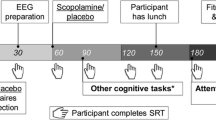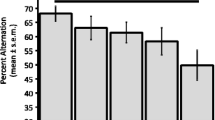Abstract
The effects of a single dose of scopolamine alone and in combination with ZK 93426 (a β-carboline antagonist at the GABAA/BZ receptor complex with weak inverse agonist activity) were tested in two studies. In one study (study 1) the emphasis of enquiry was on different stages of information processing measured by a psychometric battery; in the second study (study 2) performance at different stages of memory and psychomotor abilities was tested and electroencephalogram recordings and video-tracking were also performed. Each study consisted of two parts, part I in which scopolamine (0.5 mg; 1 ml) or placebo were administered subcutaneously, and part II in which scopolamine (0.5 mg; 1 ml) was administered subcutaneously followed by an intravenous injection of ZK 93426 (0.04 mg; 0.04 ml/kg) or placebo. Thirty-six volunteers, who were randomly allocated to receive one of the two treatments (n=18 per treatment), participated in each part. In study 1 attention was measured by a continuous attention task and a rapid information processing task, vigilance was measured by a visual vigilance task, and working memory and reasoning were evaluated by a logical reasoning task. A visual memory task was also included to measure acquisition and retention. In study 2 acquisition and short term storage and retrieval were measured by a word lists-Buschke restricted reminding procedure, and retention was tested by delayed recall and recognition. Psychomotor performance was assessed by measuring tapping speed (related to gross motoric abilities) and a pegboard task (related to fine motoric abilities). A task to measure working memory, the Pauli test, was also included. In study 1 scopolamine significantly impaired performance in the attentional and vigilance tasks (P<0.05), but there was no effect in the logical reasoning task main measurements of time and accuracy. In study 2, scopolamine also impaired performance in the psychomotor tasks (P<0.05) and the Pauli test. ZK 93426 partially antagonised most of the effects of scopolamine on memory and attention, suggesting that an interaction between the GABA-ergic and cholinergic systems is reflected in measurements of both attention and memory. In general a dissociation was found in the effects of scopolamine on memory, i.e. scopolamine impaired performance during all acquisition measurements but left retention unaffected.
Similar content being viewed by others
References
Aarsland D, Larsen JP, Reinvang I, Aasland AM (1994) Effects of cholinergic blockade on language in healthy young women implications for the cholinergic hypothesis in dementia of the Alzheimer type. Brain 117:377–1384
Arnold W (1970) Der Pauli Test. Anweisung Zur Sachgemäße Durchführung, Auswertung Und Anwendung Des Kraepelinschen Arbeitsversuches. J A Bath Verlag, München
Baddeley (1968) A 3 min reasoning test based on grammatical transformation. Psychon Sci 10:341–342
Beatty WW, Butters N, Janosky DS (1986) Patterns of memory failure after scopolamine treatment: implications for cholinergic hypotheses of dementia. Behav Neural Biol 45:196–211
Blin J, Piercey MF, Giuffra ME, Mouradian MM, Chase TN (1994) Metabolic effects of scopolamine and physostigmine in human brain measured by positron emission tomography. J Neurol Sci 123:44–51
Bowen DM, Francis PT, Chessel IP, Webster Mt (1994) Neurotransmission — the link integrating Alzheimer research? Trends Neurosci 17:149–150
Brass EP, Polinsky R, Sramek JJ, Moore M, Jones D, Veroff AE, Wardle TS, Cutler NR (1995) Effects of the cholinomimetic Sdz Ens-163 on scopolamine-induced cognitive impairment in humans. J Clin Psychopharmacol 15:58–62
Brioni JD (1993) Role of GABA during the multiple consolidation of memory. Drug Dev Res 28:3–27
Brown MW, Brown J, Bowes JB (1989) Absence of priming coupled with substantially preserved recognition in lorazepam-induced amnesia. Q J Exp Psychol 41a:599–617
Buschke H, Altman Fuld P (1974) Evaluating storage, retention and retrieval in disordered memory and learning. Neurology 24:1019–1025
Caine ED, Weingartner H, Ludlow CL, Cudahy EA, Wehry S (1981) Qualitative analysis of scopolamine induced amnesia. Psychopharmacology 74:74–80
Callaway E (1984) Human information processing: some effects of methylphenate, age and scopolamine. Biol Psychiatry 19:649–666
Cole BJ, Jones GH (1995) Double dissociation between the effects of muscarinic antagonists and benzodiazepine receptor agonists on the acquisition and retention of passive-avoidance. Psychopharmacology 118:37–41
Curran HV, Schifano F, Lader M (1991) Models of memory dysfunction? A comparison of the effects of scopolamine and lorazepam on Memory, psychomotor performance and mood. Psychopharmacology 100:463–471
Deutsch JA (1971) The cholinergic synapse and the site of memory. Science 174:788–794
Dorow R, Horowski R, Paschelke G, Amin M, Braestrup C (1983) Severe anxiety induced by Fg 7142, aβ-carboline ligand for benzodiazepine receptors. Lancet 2:98
Dorow R, Berenberg D, Duka T, Sauerbrey N (1987) Amnestic effects of lormetazepam and their reversal by the benzodiazepine antagonist Ro 15-1788. Psychopharmacology 93:507–514
Drachman DA, Leavitt J (1974) Human memory and the cholinergic system. Arch Neurol 30:113–121
Drachman DA, Sahakian BJ (1979) Effects of cholinergic agents on human learning and memory. In: Barbeau A, Crowdon JH, Wurtman RJ (eds) New York, Nutrition and the brain. Raven Press, pp 351–366
Duka T (1991) Bidirectional activity of benzodiazepine receptor ligands in cognitive functions in humans. in: Briley M, File SE (eds) New concepts in anxiety. Macmillan London, pp 440–458
Duka T, Dorow R (1995) Human experimental psychopharmacology of benzodiazepine receptor inverse agonists and antagonists. In Sarter M, Nutt DJ (eds) Inverse agonists at benzodiazepine receptors. Wiley, New York, pp 243–270
Duka T, Stephens DN, Krause W, Dorow R (1987) Humans studies on the benzodiazepine receptor antagonistβ-carboline Zk 93 426:preliminary observations on psychotropic activity. Psychopharmacology 93:421–427
Duka T, Edelmann V, Schütt B, Dorow R (1988a)β-Carbolines as tools in memory research. Human data with theβ-carboline ZK 93 426. In: Hindmarch I, Ott H, Roth T (eds) Benzodiazepine receptor ligands, memory and information processing. Psychopharmacology Suppl. 6. Springer, New York, pp 246–261
Duka T, Goerke D., Dorow R, Höller L, Fichte K (1988b) Human studies on the benzodiazepine receptor antagonistβ-carboline Zk 93 426: antagonism of lormetazepam's psychotropic effects. Psychopharmacology 95:463–472
Duka T, Stephens DN, Dorow R (1990) Cognitive enhancing properties of antagonistβ-carbolines: new insights into clinical research on the treatment of dementias? In: Maurer K, Riederer P, Beckmann H (eds) Alzheimer's disease epidemiology, neuropathology, neurochemistry clinics. Springer, Wien, pp 55–564
Duka T, Edelmann V, Dorow R, Fichte K (1992) Scopolamine induced amnesia in humans: lack of effects of the benzodiazepine receptor antagonistβ-carboline Zk 93 426. J Psychopharmacol 6:382–388
Duka T, Redemann B, Voet B (1995) Scopolamine and lorazepam exert different patterns of effects in a test battery assessing stages of information processing. Psychopharmacology 119:315–324
Frith CD, Richardson JTE, Samuel M, Crow TJ, Mc Kenna PJ (1984) The effects of intravenous diazepam and hyoscine upon human memory. Q J Exp Psychol 36a:133–144
Ghoneim MM, Mewald SP (1975) Effects of diazepam and scopolamine on storage, retrieval and organizational processes in memory. Psychopharmacologica 44:257–262
Ghoneim MM, Mewald SP (1977) Studies on human memory: the interactions of diazepam, scopolamine and physostigmine. Psychopharmacology 52:1–6
Imperato A, Dazzi L, Obinu MC, Gessa GL, Biggio G (1993) Inhibition of hippocampal acetylcholine-rel by benzodiazepines — antagonism by fllumazenil. Eur J Pharmacol 238:135–137
Kopelman MD (1987) How far could cholinergic depletion account for the memory deficits of Alzheimer-type dementia or the alcoholic Korsakoff syndrome? In: Stahl SM, Iversen SD, Goodman EC (eds) Cognitive neurochemistry Eds Oxford University Press, Oxford, pp 303–327
Lines CR, Ambrose JH, Heald A, Traub M (1993) A double-blind, placebo-controlled study of the effects of eptastigmine on scopolamine-induced cognitive deficits in healthy male-subjects. Human psychopharmacol Clin Exp 8:271–278
Litvan I, Sirigu A, Toothman J, Grafman A (1995) What can preservation of autobiographical memory after muscarinic blockade tell us about the scopolamine model of dementia. Neurology 45:387–389
Mauri M, Sinforiani E, Reverberi F, Merlo P, Bono G (1994) Pramiracetam effects on scopolamine-induced amnesia in healthy volunteers. Arch Gerontol Geriatr 18:133–139
Molchan SE, Matochik JA, Zametkin AJ, Szymanski HV, Cantillon M, Cohen RM, Sunderland T (1994) A double FDG Pet study of the effects of scopolamine in older adults. Neuropsycho-pharmacology. 10[3]:191–198
Ott H, Mcdonald RJ, Fichte K, Hermann WM (1982) Interpretation of correlation between EEG power spectra and psychological performance variables within the concepts of “subvigilance”, “attention” and “psychomotoric impulsion”. In: Hermann VM (ed) EEG In Drug Research. Gustav Fischer, Stuttgart New York, pp 227–247
Ott H, Rohloff A, Aufdembrinke B, Fichte K (1988) Anterograde and retrograde amnesia after lormetazepam and flunitrazepam. In: Hindmarch I, Ott H (eds) Benzodiazepine receptor ligands, memory and information processing. Psychopharmacology Series 6, Springer, New York, pp 180–194
Preda L, Alberoni M, Bressi S, Cattaneo C, Parini J, Canal N, Franceschi M (1993) Effects of acute doses of oxiracetam in the scopolamine model of human amnesia. Psychopharmacology 110:421–426
Randt CT, Brown ER, Osborne DP (1980) A memory test for longitudinal measurement of mild to moderate deficits. Clin Neuropsychol II 4:20–32
Richardson JTE, Frith CD, Scott E, Crow T, Cunningham-Owens D (1984) The effects of intravenous diazepam and hyoscine upon recognition memory. Behav Brain Res 14:193–199
Rusted JM (1994) Cholinergic blockade and human information processing: are we asking the right questions? J Psychopharmacol 8:54–59
Rusted JM, Warburton DM (1988) The effects of scopolamine on working memory in healthy young volunteers Psychopharmacology 96:145–152
Rusted JM, Warburton DM (1989) Effects of scopolamine on verbal memory; a retrieval or acquisition deficit? Neuropsychobiology 21:76–83
Rusted JM, Eaton-Williams P, Warburton DM (1991) A comparison of the effects of scopolamine and diazepam on working memory Psychopharmacology 105:442–445
Sahakian BJ (1988) Cholinergic drugs and human cognitive performance. In: Iversen Ll, Iversen SD, Snyder SH (eds) Handbook of psychopharmacology Vol. 20. Plenum Press, London, pp 393–424
Sahakian BJ, Coull JT (1994) Nicotine and tetrahydroaminoacradine — evidence for improved attention in patients with dementia of the Alzheimer type. Drug Dev Res 31:80–88
Safer DJ, Allen RP (1971) The central effects of scopolamine in man. Biol Psychiatry 3:347–355
Sarter M, Schneider HH, Stephens DN (1988) Treatment strategies for senile dementia: antagonistβ-carbolines. Trends Neurosci 11:13–17
Siegfried K (1995) The efficacy of cholinergic drugs in patients with Alzheimer's disease. Focus on the aminoacridines. Hum psychopharmacol clin Exp 10:89–96
Sunderland T, Tariot PN, Cohen RM, Weingartner H, Mueller EA, Murphy DI (1987) Anticholinergic sensitivity in patients with dementia of the Azheimer type and age matched controls: a dose response study. Arch Gen Psychiatry 44:418–426
Tiplady B (1985) An automated test battery for the detection of changes in mental function and psychomotor performance. Br J Clin Pharmacol 20:305p
Tiplady B (1992) Continuous attention: rationale and discriminant validation of a test designed for use in psychopharmacology. Behav Res Methods Instr Comput 24:16–21
Warburton DM, Rusted JM (1993) Cholinergic control of cognitive resources. Neuropsychobiology 28:43–46
Weingartner HJ (1985) Models of memory dysfunctions. Ann NY Acad Sci 444:359–369
Weingartner HJ, Hommer D, Lister RG, Thompson K, Wolkowitz O (1992) Selective effects of triazolam on memory. Psychopharmacology 106:341–345
Wesnes K, Warburton DM (1984) Effects of scopolamine and nicotine on human rapid information processing performance. Psychopharmacology 82:147–150
Author information
Authors and Affiliations
Rights and permissions
About this article
Cite this article
Duka, T., Ott, H., Rohloff, A. et al. The effects of a benzodiazepine receptor antagonist β-carboline ZK-93426 on scopolamine-induced impairment on attention, memory and psychomotor skills. Psychopharmacology 123, 361–373 (1996). https://doi.org/10.1007/BF02246647
Received:
Revised:
Issue Date:
DOI: https://doi.org/10.1007/BF02246647




